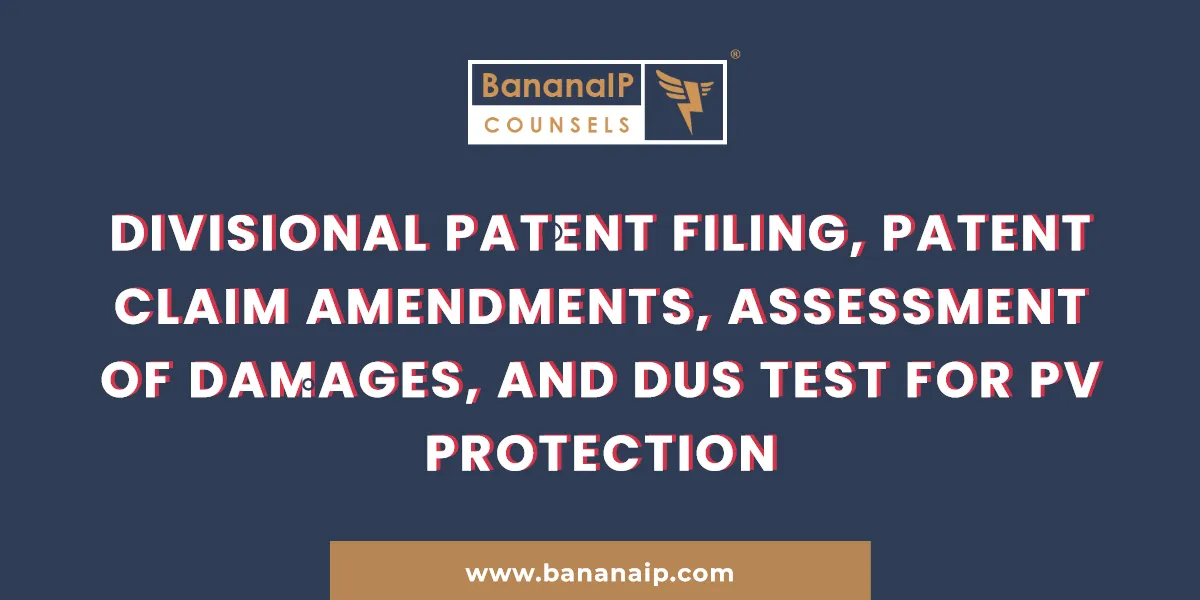In this post, we bring to you 3 interesting patent cases and a plant variety case. These cases relate to: when divisional patent applications can be filed? if claim amendments can move from method to gel formulation, assessment of patent infringement and damages based on publicly available data, and the role of DUS test in Plant Variety Protection.
Amendment of claims from method of treating bacterial vaginosis to gel formulation is permitted, says Madras High Court.
In a case involving a patent application relating to “METHOD OF TREATMENT OR PROPHYLAXIS OF BACTERIAL VAGINOSIS”, the patent applicant amended some of the claims from the method of treatment claims to gel formulation claims. The Controller of Patents refused the application stating that the amendments were not permitted under Sections 57 and 59. Setting aside the order of the Controller, the Madras High Court held that the claim amendments are permitted as gel formulation forms part of the original claims read with disclosures in the specification. The Court remanded the application to another officer for a decision within 4 months.
Citation: Starpharma Pty Ltd Vs. The Assistant Controller of Patents and Designs [(T) CMA (PT) No.22 of 2023 (OA/13/2021/PT/CHN)]
Divisional Patent Applications can be filed from Provisional or Complete Applications as long as plurality of inventions are disclosed in their specifications, holds Delhi High Court.
Answering a reference regarding the filing of divisional patent applications, the Division Bench of the Delhi High Court held that divisional applications can be filed from either the provisional or complete applications provided a plurality of inventions are disclosed in the said applications. The Court clarified that the existence of a plurality of inventions is required for both suo moto divisional filings, and divisional filings following objections of the Controller of Patents. The court also stated that the principle of ‘what is not claimed is disclaimed’ is not applicable for purposes of assessing the plurality of inventions, and that the plurality need not form part of the claims. It also inferred based on UK case law that the scope of claims in a Divisional Application can possibly be broader than those in the parent application.
Citation: Syngenta Limited Vs. Controller of Patents and Designs [C.A.(Comm. IPD-PAT) 471/2022]
Maharaja Appliances held liable for infringing Strix’s patent on liquid heating vessels.
In a case involving a patent relating to temperature controls in kettles, the Delhi High Court held that the products made by Maharaja Appliances infringed Strix’s patent titled, Liquid Heating Vessels. The Court rejected Maharaja’s claim that the patent was not valid based on a prior European patent because Strix’s patent relates to controlling temperature based on temperature in heating elements and not based on liquid temperature as disclosed in the European patent. The Court also rejected the argument of exhaustion of patent rights as Maharaja was unable to produce the Chinese patent based on which rights were exhausted. A sum of about 81 Lakh Rupees was granted as damages to Strix by an interesting assessment of damages based on publicly available information.
Citation: Strix Ltd. Vs. Maharaja Appliances Limited [CS (Comm.) 403/2018 and CC 54/2009]
The DUS test must precede advertisement of a plant variety application, the Delhi High Court reiterates.
In a case involving plant variety applications filed by MAHYCO and SUNGRO, the Plant Variety Registrar advertised the applications before the Distinctiveness, Uniformity, and Stability (DUS) test results arrived. This was challenged through writ petitions, and after reviewing the provisions of the Plant Variety Protection Act, the Delhi High Court reiterated that DUS test has to be performed before an application can be accepted and advertised. As per the Court, conducting this test is mandatory even for applications filed before 1st March 2012. Stating so, the Delhi High Court quashed and set aside the decision of the registrar to accept and advertise the applications in question.
Citation: Nuziveedu Seeds Pvt. Ltd. Vs. The Protection Of Plant Variety And Farmers Rights Authority And Ors [W.P.(C) 4312/2014, W.P.(C)-IPD 8/2022, W.P.(C)-IPD 10/2022, W.P.(C)-IPD 9/2022 & W.P.(C)-IPD 4/2023]
Conclusion
The case notes have been compiled by patent attorneys at BananaIP Counsels, a firm that specializes in providing highly specialized, technology and business driven patent services. These cases throw light on some important judicial developments in patent and plant variety law in India, and you may to read the Judgments fully to get a complete understanding of the jurisprudential value of each case.
Disclaimer
The case notes have been written by patent attorneys at BananaIP Counsels based on their understanding of the decisions/judgments delivered by Courts. You may note that other patent attorneys and experts may have differing opinions and may arrive at different conclusions about the value/importance of the cases. The case notes are not meant to be legal advice, and you are advised to approach a patent attorney before making any decision based on the case notes.
If you have any questions, speak with a Patent expert/attorney – contact@bananaip.com or 91-80-26860414/24/34.



